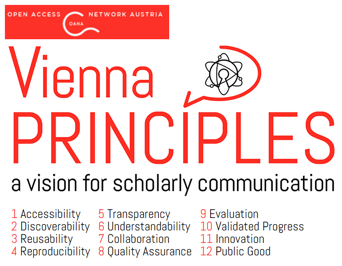The Vienna Principles: A Vision for Scholarly Communication in the 21st Century


A group of young researchers and science administrators of the Open Access Network Austria (OANA) has published a first version of The The Vienna Principles: A Vision for Scholarly Communication in the 21st Century. The principles can be annotated and discussed here.
“Open Science demands the highest possible transparency, accountability, and shareability in knowledge production, as well as the participation of (all) relevant stakeholders in the scientific process. Realms of Open Science practices include Open Access, Open Research Data, Open Methods, Open Education, Open Evaluation, and Citizen Science. The notion of Open Science is enjoying great popularity at the moment”. (15th Annual STS Conference Graz 2016 Track: The Politics of Open Science).
“Each principle needs a story, or at least a process” (FORCE11: The Future of Research Communications).
Open Science has the potential to change the production and dissemination of scholarly knowledge for the better, but there is no yet commonly shared vision that describes the scholarly communication system could be created.
Do we need to address the apparent deficits of the scholarly communication system and/or a fundamental reform of its?
Between April 2015 and June 2016, members of the Open Access Network Austria (OANA) working group “Open Access and Scholarly Communication” met in Vienna to discuss this matter. The main outcome of their considerations is a set of twelve principles that represent the cornerstones of the future scholarly communication system. These principles are:
- Accessibility: be immediately and openly accessible by anyone.
- Discoverability: should facilitate search, exploration and discovery.
- Reusability: should enable others to effectively build on top of each other’s work.
- Reproducibility: should provide reproducible research results.
- Transparency: should provide open means for judging the credibility of a research result.
- Understandability: should provide research in an understandable way adjusted to different stakeholders.
- Collaboration: should foster collaboration and participation between researchers and their stakeholders.
- Quality Assurance: should provide transparent and competent review.
- Evaluation: should support fair evaluation.
- Validated Progress: should promote both the production of new knowledge and the validation of existing knowledge.
- Innovation: should embrace the possibilities of new technology.
- Public Good: should expand the knowledge commons.
The principles are designed to provide a coherent frame of reference for the debate on how to improve the current scholarly communication system and they are testimony that the time is ripe for these integrative visions of scholarly communication and the necessary standards and infrastructures.
With ‘Vienna Principles’, OANA hopes to inspire a widespread discussion towards a shared vision for scholarly communication in the 21st century.
Read more about the principles HERE.
It is possible to annotate and comment on the document HERE.
***
Post scriptum. This milestone is one of many focused on Sustaining the Knowledge Commons (open access scholarship)

(Source: Society for Scholarly Publishing Annual General Meeting, Canada, June, 2016)
Source:
See also:
Principles Of The Scholarly Commons (Force11: The Future of Research Communications and e-Scholarship)
Austrian Science Fund (FWF) Open Access Compliance Monitoring 2015 (ZENODO, 2016)
Study report on "Open Digital Science (published by Center for Social Innovation in collaboration with Eutema and the University of Saragossa)
The Battle for Open: How openness won and why it doesn't feel like victory (London: Ubiquity Press: Open Scolarship)
ScienceGeist. Everything about research (powered by SNSF)
Related posts on AIMS:
The Open Science landscape is shifting
OA 2020: Open Access 2020 international initiative pushing towards Open Access publishing

